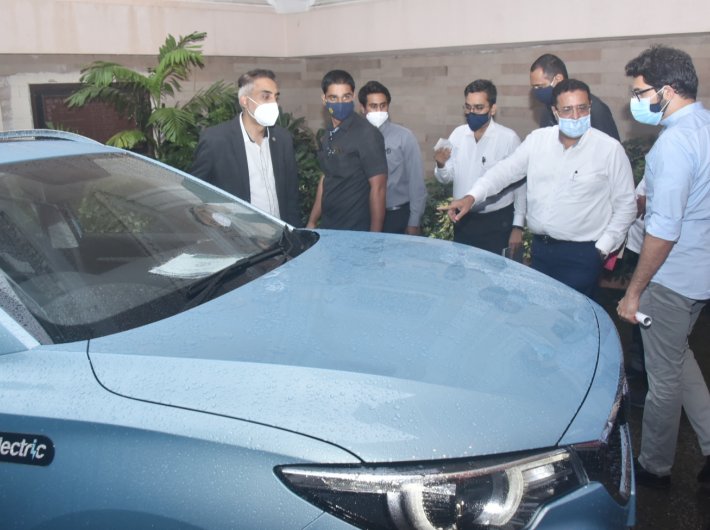To promote electric vehicles Maharashtra has announced its Electric Vehicle (EV) Policy 2021 specifically targeting six cities of Mumbai, Pune, Nagpur, Aurangabad, Amravati and Nashik. From April 2022 onwards all new government vehicles in the state will be electric vehicles.
The primary objective of policy is to accelerate adoption of BEVs in the state so that they contribute to 10% (3,00,000) new vehicle registrations per year by 2025. The six targeted cities should achieve 25% electrification of public transport and last-mile delivery vehicles by 2025.
From April 2022, all new government vehicles will be electric vehicles.
The policy proposes setting up 2,500 charging stations in seven major urban agglomerates of Mumbai, Pune, Nagpur, Aurangabad, Nashik, Amravati and Solapur and four major highways: Mumbai-Pune, Mumbai-Nashik, Mumbai-Nagpur and Pune-Nashik.
The proposed policy will be in force for four years from notification in 2021, till 2025.
The policy encompasses demand side incentives, supply side incentives and incentives for charging infrastructure. Along with these, non-fiscal incentives and developing skilled manpower to support the EV transition is proposed in the policy.
For demand side proposed incentives are in addition to FAME II (Govt of India) Incentives and will be awarded to vehicle manufacturers based on no. of vehicles registered in Maharashtra.
For charging infra development incentives, slow chargers (15,000) will get incentives up to Rs 10,000 per charger and fast chargers (500) will receive incentives up to Rs 5,00,000 per charger.
Urban local bodies (ULB) will be encouraged to provide property tax rebates to residential owners for installing private charging infrastructure within their premises and for which ULBs / PWD / MSRDC should identify locations for charging infrastructure installation.
For supply side Incentives, all benefits under ‘D+’ category of mega projects will be provided to these industries irrespective of location of manufacturing unit in the state. This incentive will be applicable from the date of notification of policy and will be disbursed through Industries, energy and labour dept.
For non-fiscal incentives, the policy says that it shall endeavour to fast-track and ensure time bound registration of EVs, including EV fleets owned by aggregators, last mile delivery providers, logistics players, etc.
The policy will encourage fleet aggregators to operate electric vehicles as per the Motor Vehicle Aggregator Guideline 2020 issued by the Ministry of Road Transport and Highways.
Further, the policy mandates that all upcoming type of property projects have to mandatorily provide EV ready parking, residential buildings have to provide 20% EV parking, institutional and commercial complexes 25% and all government offices 100% EV parking.
The steering committee under the chief secretary will assess the policy effectiveness and revise the policy on timely basis.
An EV monitoring Cell will be under the purview of the Environment and Climate Change Department.
A budget of Rs 930 crore has been provisioned for ‘demand side’ and ‘charging infra’ incentives for a period of four years. The policy provides for levying Green tax on re-registration of old vehicles, fuel cess etc for implementation.
The Uddhav Thackeray government aims to transform Maharashtra into a leading state in terms of adoption of electric vehicles in the country as well as leading manufacturing and investment hub for the EV ecosystem globally.
The policy was approved in a cabinet meeting last week and was announced by the minister for environment, Aaditya Thackeray, additional chief secretary (Transport) Ashish Singh and senior government officials on Wednesday.
Welcoming the policy, transport expert Ashok Datar asked where will the funds come from if Maharashtra seriously wants to implement the policy, considering the fact that every state is facing a shortage of funds. He suggested that the government should start levying surcharge on regular cars which will encourage EVs and discourage non-EVs; otherwise the government will curtail budgets of other sectors.
“We must cross-subsidize and cars that use fossil fuels should bear the subsidy for EV. Subsidy on EV should be accompanied by at least doubling of one-time tax on regular cars and due to subsidy manufacturers should not increase the cost of EV. It should be specifically mentioned that if the cost of EV is increased, subsidy will not be available,” he said, adding that the government can further bring in electric buses and electric cycles so that a person earning Rs 25,000 too can afford an electric bicycle.

